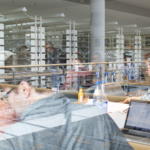DARIAH is perhaps the world’s largest organisation providing an international infrastructure for digital humanities: its mission is to help researchers in the field of humanities to get acquainted with the most advanced computing tools and methods.
DARIAH’s Horizon 2020 funded project Humanities at Scale promotes the creation of regional hubs within the European Research Area in order to make regional research more visible and encourage international cooperation at a pan-European level.
The Centre for Digital Humanities at ELTE, with the support of DARIAH, initiates a Central European cooperation and organises a public workshop on November 10, 2017, between 10:00-17:00 at the ELTE BTK Institute of History, the Szekfű Gyula Library (1088 Budapest, Múzeum krt. 6-8.)
At the gathering, representatives of leading institutions in digital humanities from Austria, the Czech Republic, Poland, Slovakia and Hungary talk about local/regional cooperations, the institutional systems, good practices, cooperation opportunities across borders and the benefits of the international infrastructure.
Program schedule:
10:00 Introduction of the DARIAH Nordic Hub
Digital Humanities infrastructure in Central Europe: presentations
10.30 Austria
11:30 Czech Republic
Lunch break
14:00 Poland
14:30 Slovakia
15.30 Presentation of the APIS project
16:00 Hungary
PARTICIPANTS
Zsolt Almási
(Pázmány Péter Catholic University, Hungary)
Silvie Cinková
(Charles University, Czech Republic)
Andrej Gogora
(Slovak Academy of Sciences, Slovak Republic)
Jan Hajič
(Charles University, Czech Republic)
Michał Kozak
(Poznań Supercomputing and Networking Center, Poland)
Katalin Lejtovicz
(ACDH – Austrian Centre for Digital Humanities, Austria)
Martin Lhoták
(Charles University, Czech Republic)
Gábor Palkó
(ELTE.DH, Hungary)
Marianne Ping Huang
(Aarhus University, Denmark)
Gerlinde Schneider
(University of Graz, Austria)
Tanja Wissik
(Austrian Centre for Digital Humanities, Austria)
Miroslav Zumrík
(Slovak Academy of Sciences, Slovak Republic)
Humanities at Scale has received funding from the European Union’s Horizon 2020 research and innovation programme under grant agreement No 675570.



 This project has received funding from the European Union’s Horizon 2020 Research and Innovation programme under Grant Agreement No. 675570.
This project has received funding from the European Union’s Horizon 2020 Research and Innovation programme under Grant Agreement No. 675570.
 project.
project.